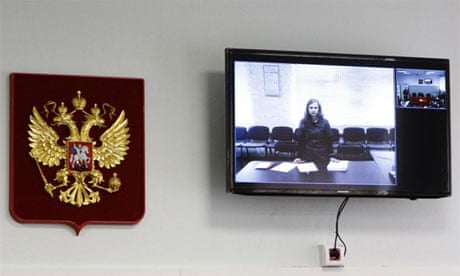Pussy Riot's Maria Alyokhina, jailed for an anti-Kremlin protest last autumn, has ended an 11-day hunger strike. Alyokhina's representatives claimed she had provoked "unprecedented" concessions by Russian officials, who agreed to relax security procedures at the prison where the 25-year-old is being held.
Alyokhina announced her hunger strike on 22 May, in the middle of a parole hearing in the remote Russian village of Berezniki. Although the musician was being held across the street from the courthouse, she had been forbidden from appearing in person; over a video link she said her "rights were being violated" by prison authorities and ordered her lawyers to boycott the proceedings.
Since then, Alyokhina's complaints have shifted focus from her parole hearing to conditions at the prison colony. According to her lawyer, Irina Khrunova, officials imposed excessive security measures in an attempt to turn the other inmates against her. "All she's asking is to be treated fairly," Khrunova said last week.
Prison wardens have now reportedly eased some of their regulations, prompting Alyokhina to end her fast. "It seems the public reaction [to Maria's strike] was so big that there was a political decision," Pyotr Verzilov, the husband of fellow Pussy Riot convict Nadezhda Tolokonnikova, told Reuters. "They organised an 'excursion' for Maria today, where she was shown that all her demands, like removing metal locks from doors and easing 24-hour surveillance on certain inmates, were met."
Alyokhina and Tolokonnikova, who is being held in a distant prison, were both recently refused parole; they are appealing the rulings. Meanwhile, a Moscow court dismissed an appeal of the women's original sentencing. "They are simply hooligans," the court chairman, Olga Yegorova, told journalists. Although a third Pussy Riot member, Yekaterina Samutsevich, was freed last October, Alyokhina and Tolokonnikova are not due to be released until March 2014.
Last month, Paul McCartney became the latest celebrity to speak out against the treatment of Pussy Riot's jailed band members, calling on Russia's "great tradition of fair-mindedness". Alyokhina, Tolokonnikova and Samutsevich were arrested in March 2012, after staging a 40-second protest at Moscow's Christ the Saviour Cathedral. They were sentenced to two years in prison for "hooliganism motivated by religious hatred".
While Dmitry Medvedev, the Russian prime minister, has called for the remaining Pussy Riot prisoners to be released, president Vladimir Putin has described their protest as a depraved "orgy". "We have red lines beyond which starts the destruction of the moral foundations of our society," he said in October. "If people cross this line they should be made responsible in line with the law."

Comments (…)
Sign in or create your Guardian account to join the discussion